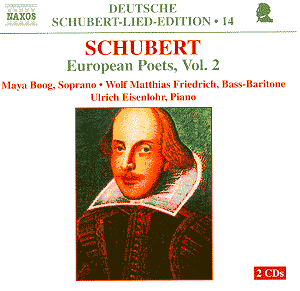We tend to think of lieder as German settings
of German poems, but the Austrian-German literary circles of Schubertís
day, richly endowed though they were in romantic poets of their
own, showed considerable interest in foreign authors, of which
they translated a great many. All the poems on the first disc
are of British origin. The choice of Shakespeare is not surprising
("Who is Sylvia?", "Come, thou monarch of the vine"
and "Hark, hark, the lark" are the English titles of
D.891, D.888 and D.889), nor maybe is that of Colley Cibberís
touching poem "The Blind Boy", but it is interesting
that they hit upon Pope ("Verklärung": "The
dying Christian to his soul"), Cowley ("Der Weiberfreund":
"The Inconstant") and a Scottish Ballad, "Edward",
from Percyís "Reliques" (Brahms based the first of his
Ballades, op. 10, on this poem). Inexplicable to us now is the
enormous vogue for James Macphersonís pseudo-Celtic "Ossian"
fragments, gloomy, indigestible stuff which surely holds no interest
for anyone today. And herein lies the problem with this CD. While
there are many lieder which are so beautiful that it need not
worry us if the words are of poor quality, in "Die Nacht"
and "Der Tod Oscars" Schubert provides a sort of dramatic
declamation interspersed with melodramatic piano interludes which
is unlikely to hold the interest of anyone who does not understand
the words and love them. Wolf Matthias Friedrich is a fine singer
and goes through the gamut of Fischer-Dieskau-inspired expression,
but these two songs last, respectively, 11í 39" and 14í23"
and I donít relish hearing them again. Iím all in favour of widening
my knowledge of Schubert lieder, and normally a CD of mainly little-known
pieces would guarantee more than a few treasures, but Iím afraid
that in this case it is with good reason that the best known are
"An Silvia", "Ständchen" (though the
"Trinklied" which separates them is a spirited affair)
and "Der blinde Knabe".
And this brings me to another problem. As Iíve
said, Friedrich is a good singer, but the three popular songs
(and roughly half the others) fall to Maya Boog. I thought it
a little strange to have a woman sing "An Silvia" and
"Ständchen" when there is a man around who could
have done it, but in the former case I found I had alternative
soprano versions by Lott and Schwarzkopf. Both these are considerably
slower, and if Lott and Graham Johnson sound heavy in their tempo,
Schwarzkopf does not, thanks to the ineffable poetry drawn from
the piano part by that prince of Schubertians, Edwin Fischer.
By their side Boog seems breathless, insecure and squally, and
her pianist impatient. In "Ständchen", on the other
hand, this team is slow and heavy. Fischer-Dieskau sounds much
fuller of the joys of early morning, and Eisenlohr would do well
to listen to Gerald Mooreís light and humorous handling of the
piano part. In "Der blinde Knabe" Boogís line is sketchy
compared with the effortless delivery of Margaret Price (on Classics
for Pleasure).
Priceís disc also includes, "La pastorella",
the first song on the second disc under review. Interestingly,
here it is Boog and Eisenlohr who make a better impression, light
and carefree, than the rather stately Price. Singers will often
tell you that Italian is the best language for singing, whatever
your native tongue may be, and Boog certainly sounds much more
at ease here, her roulades tossed off neatly. But elsewhere the
Italian songs have their dramatic moments, and problems return.
In truth, I think she is a charming light soprano who would probably
make a very nice Despina or Zerlina, but is overparted (at least
for the moment) by anything requiring more power.
The second CD, then, is mostly Italian, with
a few concluding odds and ends (songs from French and Slovenian,
and a rare and unfinished Psalm setting). Some of these are very
early pieces, set as exercises for Schubertís teacher Salieri,
but later he made some more Italian settings on his own account,
culminating in the "Three songs for bass", D. 902. It
is fascinating to find a late work (1827) which has nothing of
the melancholy we associate with this period in Schubertís life;
instead it reflects his love of Rossini. It would be unkind to
dismiss the songs as pastiche for they are as good as the real
thing! Unlike Boog, I find Friedrich a little less effective in
Italian than in German, and also I feel that a real Italian basso,
with some growling bottom notes, is called for rather than a bass-baritone.
Giuseppe Taddei in his prime would have been the man for the job.
The early songs are mostly charming, scarcely
distinguishable from the "arie da camera" of Donizetti
or, particularly, Bellini. Although Schubert was able to set Italian
effectively, for his Petrarch sonnets he used a translation. The
result is poised midway between the Italian style and something
recognizably Schubertian, and he seems not greatly engaged. Very
beautiful, on the other hand, is the Slovenian setting, "Die
Sternenwelten".
I fear this is an issue for those determined
to collect the whole series. Too often the Schubert we love seems
far away and it does not help that one of the singers is sub-standard.
If you are collecting the series, you can be assured of the recording
quality and of the notes (with texts and translations) by Eisenlohr,
who is masterminding the whole enterprise. These may not have
the encyclopaedic dimensions of Graham Johnsonís in the Hyperion
edition, but they are still far more detailed than we have a right
to expect at this price, and in some cases are more interesting
than the music.
Christopher Howell

